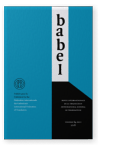Vol. 64:1 (2018) ► pp.63–80
Benjamin and Borges
Reflections on afterlife and translation
Borges’ works deconstruct the time lag conceived in the binaries such as the work’s production vs. its criticism, the original text vs. its translation, the source text vs. the derivative nature of the target text, and reality vs. fiction. Benjamin, as Borges’ near contemporary, echoes rather the same idea in his post-Nietzschean philosophy of translation. Focusing on the similarities between the views of Benjamin on translation and those of Borges as reflected in his stories as well as his essays, particularly in his well-received essay on translations of Thousand and One Nights and in his meta-fictional short story ‘Pierre Menard’: Author of the Quixote, this paper aims at bringing the two scholars together in the context of literary translation studies in the postmodern era, where intersemiotic and intertextual collage (in Eco’s terminology) and mimicry bear witness to the claim that translation, like other intertextual enterprises, is neither inferior to the other intertextual undertakings such as writing, nor is it detached from language as post-structurally conceived. Furthermore, another core objective of this study is to show how Borges’ ‘Menard’ heralds and truly represents the translation theories built upon the underlying assumptions of deconstructionism since the 1980s. It is concluded that as far as postmodern and poststructuralist theories are concerned, both Borges’ and Benjamin’s works had predicted the future of literary and translation theories in which the decisive role of translation and translator in the construction of culture and identities cannot be denied.
Article outline
- 1.Introduction
- 2.Background
- 3.Translation as original
- 4.Borges as translator
- 5.Ontological echoing of ‘Menard’s’ Quixote in Benjamin’s afterlife
- 6.Conclusion
- Acknowledgments
-
References
